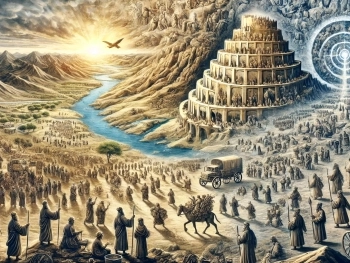Tag: Noah’s descendants

What Is the Origin of the Japanese and Chinese Peoples? A Biblical Perspective
The question of the origins of nations and peoples has fascinated humanity for centuries. From a biblical perspective, the origins of all nations can be traced back to the descendants of Noah’s three sons—Shem, Ham, and Japheth—following the gr...
About
Welcome to Free Bible: Unearthing the Past, Illuminating the Present! Step into a world where ancient history and biblical narratives intertwine, inviting you to explore the rich tapestry of human civilization.
Discover the captivating stories of forgotten empires, delve into the customs and cultures of our ancestors, and witness the remarkable findings unearthed by dedicated archaeologists.
Immerse yourself in a treasure trove of knowledge, where the past comes alive and illuminates our understanding of the present.
Join us on this extraordinary journey through time, where curiosity is rewarded and ancient mysteries await your exploration.
Recent posts
-

Faith Through Art: Bible Craft Ideas for Teens and Children
Faith can take many forms—spoken, sung, or even painted. For teens and children, expressing spirituality through art is a hands-on way to explore biblical themes while having fun and developing creative skills. Crafting allows young believers to interact with stories, symbols, and lessons in a way that feels personal and... -

The Kings of Persia in the Bible: Historical and Theological Perspectives
The Persian Empire looms large in the latter chapters of the Hebrew Bible, not only as a dominant world power but as an unexpected instrument of divine will. While ancient empires like Egypt, Assyria, and Babylon are often depicted as oppressors of Israel, the kings of Persia occupy a more... -

Babylon, Persia, and the Exile: How Iran Shaped Jewish Identity
The Babylonian exile is often seen as one of the darkest moments in Jewish history—a time of destruction, displacement, and despair. Yet, it was also a transformative period, one that reshaped Jewish faith, practice, and identity in profound ways. While Babylon (in modern-day Iraq) was the setting for exile, it... -

Zion and Susa: Two Sacred Cities in Dialogue Through History
At first glance, Zion—the biblical name for Jerusalem—and Susa—the ancient royal city of Persia—seem worlds apart. One is the spiritual heart of the Hebrew Bible and Jewish tradition; the other, a seat of imperial power in ancient Iran, known from royal inscriptions and palatial ruins. Yet within the pages of... -

Apocalyptic Visions and Persian Power: Iran in the Books of Daniel and Ezra
Ancient Persia—modern-day Iran—plays a pivotal but often underexplored role in the prophetic and apocalyptic literature of the Hebrew Bible. Two books in particular, Daniel and Ezra, shed light on the complex intersection of divine vision and imperial rule. Set against the backdrop of Persian dominance, these texts offer both a...
Main Menu
- Ancient Assyrian Social Structure
- Ancient Babylonia
- Ancient Canaan During the Time of Joshua
- Ancient History Timeline
- Ancient Oil Lamps
- Antonia Fortress
- Archaeology of Ancient Assyria
- Assyria and Bible Prophecy
- Augustus Caesar
- Background Bible Study
- Bible
- Biblical Geography
- Fallen Empires - Archaeological Discoveries and the Bible
- First Century Jerusalem
- Glossary of Latin Words
- Herod Agrippa I
- Herod Antipas
- Herod the Great
- Herod's Temple
- High Priest's in New Testament Times
- Jewish Literature in New Testament Times
- Library collection
- Map of David's Kingdom
- Map of the Divided Kingdom - Israel and Judah
- Map of the Ministry of Jesus
- Matthew Henry Bible Commentary
- Messianic Prophecy
- Nero Caesar Emperor
- Online Bible Maps
- Paul's First Missionary Journey
- Paul's Second Missionary Journey
- Paul's Third Missionary Journey
- Pontius Pilate
- Questions About the Ancient World
- Tabernacle of Ancient Israel
- Tax Collectors in New Testament Times
- The Babylonian Captivity
- The Black Obelisk of Shalmaneser
- The Books of the New Testament
- The Court of the Gentiles
- The Court of the Women in the Temple
- The Destruction of Israel
- The Fall of Judah with Map
- The History Of Rome
- The Incredible Bible
- The Jewish Calendar in Ancient Hebrew History
- The Life of Jesus in Chronological Order
- The Life of Jesus in Harmony
- The Names of God
- The New Testament
- The Old Testament
- The Passion of the Christ
- The Pharisees
- The Sacred Year of Israel in New Testament Times
- The Samaritans
- The Scribes
Ancient Questions
- Where was the location of the Transfiguration?
- Who Was Delilah?
- What is the Extent of the New Testament World?
- What is the Bronze Bust of Augustus?
- What is the Extent of the Old Testament World?
- When did Jerusalem become the Capital of Israel?
- Did Tiberius Caesar Know Jesus was Being Crucified?
- What was life like for women in ancient Rome?
- What was the Wilderness of Judea?
- What is the Black Obelisk?
Bible Study Questions
- Exploring the Extended Bible (EXB): Integrated Reference Material, Comparative Analysis, and Study Bible Formats
- How do we reconcile the existence of evil with the idea of a loving God?
- Comparing the NRSV-CE and NRSVACE: Specific Differences, Historical Context, and Comparison with British Catholic Bible Translations
- What is the role of the Holy Spirit in the life of a believer?
- How do we understand the concept of the Trinity?
- What are the different genres of literature found in the Bible?
- The Voice Bible: Specific Aspects, Comparison to Other Paraphrases, Impact on Bible Study, and Theological Distinctives
- The Holman Christian Standard Bible (HCSB) and Christian Standard Bible (CSB): A Detailed Historical Post
- How do we discern and apply biblical principles to contemporary ethical issues?
- Exploring the Differences Between The Living Bible (TLB) and the New Living Translation (NLT): Impact of Paraphrases on Bible Study